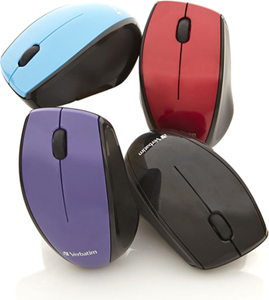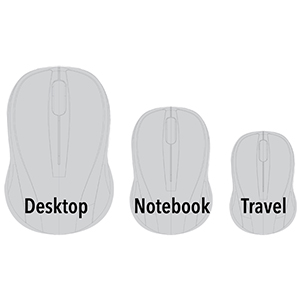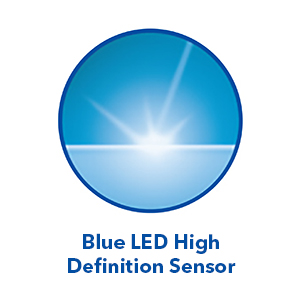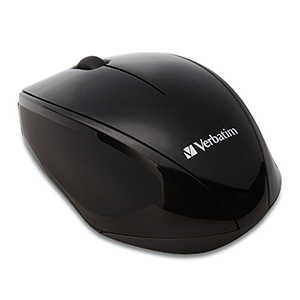Verbatim Wireless Multi-Trac Blue LED Optical Mice
Navigate virtually anywhere with the Verbatim Wireless Multi-Trac Blue LED Mouse. The comfort-grip shape provides ease of use while Blue LED technology allows users to point and click on more surfaces than other mice - from a glass table to the granite kitchen counter! The small nano receiver can be stored in the battery compartment, offering convenient storage and portability which makes this a great full-size go everywhere computer accessory.
Things to Consider

Desktop vs. Notebook vs. Travel
Desktop: In general, a desktop mouse is designed to work with a desktop computer, and is the largest in size. They are available in both corded and wireless varieties.
Notebook: In comparison with desktop mice, notebook mice are usually smaller, as they are designed to navigate smaller tabletops or desk areas, and for portability. Like desktop mice, notebook mice are available in both corded and wireless varieties. If selecting a corded notebook mouse, consider one with a retractable USB cable to save on space when on the go. If you are going cordless, look for features like nano receivers (small USB receivers designed to remain plugged into your laptop) or consider a Bluetooth mouse, just be sure your laptop is Bluetooth compatible.
Travel:Travel mice are very similar to notebook mice in that they are designed for portability. For many, the terms are interchangeable. For travel mice, the things to focus on are convenience and mobility. Definitely look for a retractable USB cable if looking for a corded mouse, and look for wireless mice with nano receivers that can remain plugged in at all times, or store conveniently in the mouse.
TIP:Looking for a mouse for children? Consider a notebook or travel mouse. Because of their smaller size, they make ideal mice for children.

Blue LED vs. Laser vs. Optical Technology Blue LED, Laser and Optical, when used to describe a mouse, refer to the method by which the mouse tracks movement. The technologies vary in surface compatibility, precision and recommended use. More detail about each of these tracking technologies can be found below.Blue LED: Blue LED is the next generation of technology in mice, outperforming both optical and laser mice. The combination of a large beam with image sensors and pixel geometry allows the mouse to track almost any surface. The Blue LED technology has a much stronger sensitivity allowing you to navigate, point, click and scroll with precision never before available. Blue LED mice are recommended for people who take their laptop and mice on many surfaces such as carpet, wood, tile, marble and glass. Laser: Laser mice track movement via a laser reflected off the work surface. They have a standard tracking sensitivity of 2,000 dots per inch, and work on most flat surfaces. Highly sensitive, laser mice are ideal for detailed applications such as graphic design and computer gaming; however, some users may find them too sensitive for general computing needs. Optical:Optical mice track movement viaa red LED light reflected off the work surface. They have a tracking sensitivity of about 800 dots per inch, less precise than their laser counterparts. Optical mouse sensitivity is suitable for most general computing needs. Optical mice are not recommended for use on highly reflective or shiny surfaces, such as glass or mirrored tabletops.

Wired vs. Wireless vs. Bluetooth Both wired and wireless mice have their advantages and disadvantages. The trick is understanding the benefits and limitations of each type of mouse, and choosing the one that best suits your specific needs. More detail on selecting a wired vs. Wireless mouse can be found below. Wired: A wired mouse is a mouse with a corded connection to your computer a typically to the USB port on your computer, laptop, keyboard or docking station. Cord length on a wired mouse is generally sufficient for navigating the area around your desktop. The advantage of a wired mouse is that it obtains its power from the host device - your computer, and therefore does not require batteries. For users on the go, wired mice with retractable USB cables are available, providing the benefits of a wired mouse, without the hassle of winding up cables. Wireless: A wireless mouse is a cordless USB device. A receiver plugged into the USB port on your computer or laptop transmits tracking information from the mouse to your computer. USB receivers are available in a variety of sizes. Nano, designed to be small enough to remain plugged into your computer or laptop, is the smallest receiver available. Wireless mice are popular with laptop users because of their sleek design and ease of travel. They are typically battery operated, and contain an on/off switch to help conserve battery life.Bluetooth: Bluetooth is a specific type of wireless technology, and requires a Bluetooth-enabled device. It has no cords, and no receivers. The advantage of the Bluetooth mouse is that because it does not require a receiver, it doesn't tie up any of your USB ports. However, potential buyers should confirm that their device is Bluetooth enabled before considering purchase. Like other wireless mice, Bluetooth mice are battery operated, and typically contain an on/off switch to help conserve power.